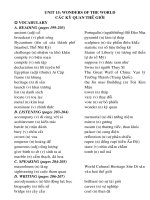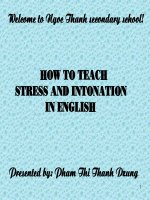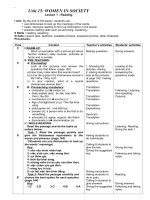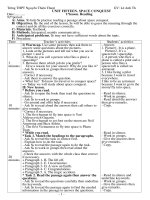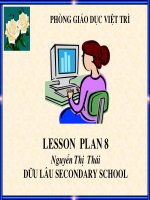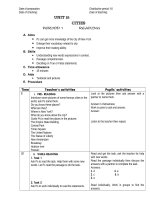unit 15
Bạn đang xem bản rút gọn của tài liệu. Xem và tải ngay bản đầy đủ của tài liệu tại đây (121.95 KB, 10 trang )
<span class='text_page_counter'>(1)</span><div class='page_container' data-page=1>
<i>Week:</i> <i>Teaching date:</i>
<i>Period:</i> <i>Preparing date:</i>
<b>UNIT 15: CITIES</b>
<b> VOCABULARY </b>
<b>Vocabulary</b> <b>Pronunciation</b> <b>Meanings</b>
<b>A. READING </b>
1. well-known (adj) ['wel'n±Un] <sub>nổi tiếng</sub>
2. The Empire State Building ['empai± steit 'bildiN] <sub>Cao ốc văn phòng Empire State</sub>
3. The United Nations Headquarters [ju:'naitid 'neiSn
'hed'kwỴ:t±] Cơ quan đầu não của LHQ
4. state (n) [steit] bang (ở Mỹ)
5. headquarters (n) ['hed'kwỴ:t±] trụ sở chính, cơ quan đầu não
6. Times Square [taim skwe±] Quảng trường thời gian
7. Central Park ['sentr±l p¿:k] Công viên trung tâm
8. be located in + place [l±U'keitid;
'l±Ukeited] đặt ở, nằm ở
9. mingle with (v) ['miNgl] hịa trộn với
10. harbour (n) ['h¿:b±] cảng biển
11. ice-free (adj) ['aisfri:] <sub>khơng bị đóng băng</sub>
12. metropolitan (adj) [,metr±'p{lit±n] <sub>(thuộc) khu đơ thị lớn</sub>
13. found (v) [faUnd] khai sáng, sáng lập
14. Dutch (n) [dÝtS] người Hà Lan
15. take over (v) ['teik,±Uv±] tiếp quản
16. rename (v) [,ri:'neim] <sub>đặt tên lại</sub>
17. unusual (adj) [Ýn'ju:Zl] khác thường, đặc biệt
18. global finance (n) ['gl±Ubl fai'nỉns] nền tài chính tồn cầu
19. characterise (v) ['kỉr±kt±raiz] đặc trưng hóa
20. attract (v) [±'trỉkt] <sub>thu hút </sub>
21. Statue of Liberty (n) ['stỉtSu:] ['lib±ti] <sub>tượng nữ thần tự do</sub>
22. art gallery (n) [¿:t 'gỉl±ri] phòng triển lãm NT
<b>B. SPEAKING </b>
23. area (n) ['e±ri±] diện tích
24. transport (n) ['trỉnspỴ:t] giao thông
25. AD (Anno Domini) (n) [,ei 'di:] sau công nguyên
26. convenient (adj) [k±n'vi:ni±nt] <sub>thuận tiện </sub>
27. formal (adj) ['fỴ:ml] trang trọng
28. open (adj) ['±Up±n] cởi mở
29. reserved (adj) [ri'zÄ:vd] dè dặt, kính đáo
30. comparison (n) [k±m'pỉrisn] <sub>sự so sánh</sub>
<b>C. LISTENING </b>
31. hold (v) [h±Uld] <sub>cầm, giữ </sub>
32. suburb (n) ['sÝbÄ:b] <sub>noäi ô</sub>
33. friendship (n) ['frendSip] tình bạn
34. include (v) [in'klu:d] bao gồm, gồm có
35. except (v) [ik'sept] loại ra, trừ ra
36. height (n) [hait] <sub>chieàu cao </sub>
37. weight (n) ['weit] trọng lượng
</div>
<span class='text_page_counter'>(2)</span><div class='page_container' data-page=2>
39. base (n) [beis] cái bệ
<b>D. WRITING </b>
40. description (n) [dis'kripSn] sự miêu tả
41. cover (v) ['kÝv±] chiếm (diện tích)
42. The St. Paul’s Cathedral [k±'Hi:dr±l] <sub>nhà thờ lớn của St. Paul</sub>
43. The Tower Bridge on the River
Thames
['taU±] [bridZ]
44. ideal (adj) [ai'di±l] <sub>lý tưởng </sub>
45. get away from (exp) tránh khỏi
46. Roman (n) ['r±Um±n] người La Mã
47. situate (v) ['sitjUeit] đặt ở vị trí
48. Houses of Parliament (House of
Commons; House of Lords)
[haUs] ['p¿:l±m±nt]
['kỴm±n] [lỴ:d] Ở Anh quốc có hai viện là (Hạ <sub>nghị viện; Thượng nghị viện).</sub>
<b>E. LANGUAGE FOCUS </b>
49. indicate (v) ['indikeit] <sub>cho biết, chỉ ra</sub>
50. comma (n) ['kỴm±] dấu phẩy
51. East Coast [i:st k±Ust] bờ biển phía đơng
52. host (v) [h±Ust] <sub>đăng cai tổ chức</sub>
53. temple (n) ['templ] <sub>đền thờ </sub>
54. although (conj) [Ỵ:l'T±U] mặc dù
55. contrast (n) ['kỴntrỉst] sự tương phản
56. neighbourhood (n) ['neib±hUd] <sub>hàng xóm</sub>
57. tourist destination (n) ['tU±rist ,desti'neiSn] <sub>điểm đến du lịch </sub>
<b> GRAMMAR:</b>
<b>A. DEFINING AND NON-DEFINING RELATIVE CLAUSES.</b>
<b>1. Restrictive clauses/ Defining relative clauses. (Mệnh đề quan hệ giới hạn):</b>
_ Mệnh đề quan hệ giới hạn dùng để bổ nghĩa cho danh từ hoặc đại từ đứng trước nó, nên khơng thể bỏ
được
<b>2. Non-restrictive clauses / Non-defining clauses. (Mệnh đề quan hệ không giới hạn)</b>
_ Mệnh đề quan hệ không giới hạn dùng để cung cấp thêm thông tin phụ, không cần thiết cho ngữ nghĩa
của câu, nên có thể bỏ đi được.
_ Mệnh đề quan hệ không giới hạn luôn được tách bởi mệnh đề chính bằng dấu phẩy.
_ Danh từ trong mệnh đề không giới hạn được xác định bởi:
+ Danh từ riêng (Mr. John, HCM city…)
+ Đại từ chỉ định (This/that/these/those +N…)
+ Tính từ sở hữu (My/his/her…+N)
+ Danh từ có cụm trạng ngữ chỉ nơi chốn (The girl in the class room …)
Ex: <i><b>That</b></i> man, who is standing over there, is my teacher.
<b>3. Relative Pronouns:</b>
<b>Defining relative clauses</b> <b>Non-defining clauses</b>
1. Who: dùng để thay thế cho chủ từ là người.
@ N + who + V
Eg: The man is my teacher. He is standing over there.
The man <i><b>who </b></i>is standing over there is my teacher.
N S V
1. Who: dùng để thay thế cho chủ từ là người.
@ N ,+ who + V
Eg: My father is a teacher. He is standing over there.
My father, <i><b>who </b></i>is standing over there, is a teacher
<b> N S V</b>
2. Whom: dùng để thay thế cho tân ngữ là người.
@ N + whom + S + V
Ex: The man is my teacher. You met him yesterday.
2. Whom: dùng để thay thế cho tân ngữ là người.
@ N, + whom + S + V
</div>
<span class='text_page_counter'>(3)</span><div class='page_container' data-page=3>
The man <i><b>whom</b></i> you met yesterday is my teacher.
N O S V
Mr. John, <i><b>whom</b></i> you met yesterday, is my teacher.
N O S V
3. Whose: - dùng để thay thế cho tính từ sở hữu
chỉ người.
- Sau “Whose” phải có danh từ.
@ N + whose + N + & V
( S + V
Ex1: The man is my teacher. His son is very
intelligent.
The man <i><b>whose son</b></i> is very intelligent is my teacher.
N V
Ex2: The man is my teacher. I borrowed his books
yesterday.
The man <i><b>whose books</b></i> I borrowed yesterday is my
teacher.
N S V
3. Whose: - dùng để thay thế cho tính từ sở hữu
chỉ người.
- Sau “Whose” phải có danh từ.
@ N ,+ whose + N + & V
( S + V
Ex1: Mr. John is my teacher. His son is very
intelligent.
Mr. John, <i><b>whose son</b></i> is very intelligent, is my teacher.
N V
Ex2: Mr. Hung is my teacher. I borrowed his
books yesterday.
Mr. Hung, <i><b>whose books</b></i> I borrowed yesterday is
my teacher.
N S V
4. Which: dùng để thay thế cho chủ từ, tân ngữ là
vật, sự việc.
@ N + which + & V
( S + V
Ex1: This is the book. It is very interesting.
" This is the book <i><b>which</b></i> is very interesting.
S V
Ex2: This is the book. I like it best.
" This is the book <i><b>which</b></i> I like best.
O S V
4. Which: dùng để thay thế cho chủ từ, tân ngữ là
vật, sự việc.
@ N + which + & V
( S + V
Ex1: This is my book. It is very interesting.
" This is my book <i><b>which</b></i> is very interesting.
S V
Ex 2: This book is very interesting. I read it yesterday.
This book, <i><b>which</b></i> I read yesterday, is very interesting.
O S V
5. That: That được dùng để thay thế cho who,
whom, which
Ex: This is the book <i><b>which</b></i> I like best.
" This is the book <i><b>that </b></i>I like best.
- After the superlative form (sau pheùp so sánh
nhất)
Ex: This is the most beautiful girl that I’ve ever
seen.
- After some words such as “first, second, last,
only, very, any,...” (sau những từ như : first,
second, last only, very, any …)
Ex: I read every<b> book that I can borrow.</b>
- The antecedent is both persons and things (Khi
tiền ngữ chỉ cả người lẫn vật)
Ex: I saw men, women, cats and dogs <i>that</i>
moved around and around.
<i><b>Note:</b></i>
“That” is not used in non-restrictive clauses.
(“That” không được dùng trong mệnh đề quan hệ
không giới hạn.)
<b>B. </b><i><b>ALTHOUGH </b></i><b>to connect contrasting ideas. (Mặc dù) là liên từ nhượng bộ diễn tả sự tương phản.</b>
Form:
Eg: This city is small. It is very clean and beautiful.
</div>
<span class='text_page_counter'>(4)</span><div class='page_container' data-page=4>
- Có thể dùng liên từ “but”, và từ nối “however” để thay thế cho although.
Eg: This city is small, but it is very clean and beautiful
This city is small; however, it is very clean and beautiful
<i><b>Notes</b></i>: - “but” thường theo sau dấu phẩy.
- <b>“However” thường theo sau dấu chấm phẩy.</b>
<b>EXERCISES.</b>
<b>Exercise 1. Join each pair of sentence, using a relative pronoun. Use commas if necessary.</b>
1. He gave me the information. I wrote it down at once.
...
2. Andrea went to see the dentist. He took out two of her teeth.
...
3. Fritz lives in the house round the corner. It has a red front door.
...
4. Show me the shoes. You bought them yesterday.
...
5. Have you seen the film? It’s on at the Odeon.
...
6. My boyfriend refused to go to the concert with me. He hates country music.
...
7. Edward has just moved to France. His mother died last year.
...
8. We didn’t want to swim in the sea. It looked very dirty.
...
9. Lydia is reading that fascinating book on Spanish history. You lent it to her last week.
...
<b>Exercise 2. Combine the following sentences, using ALTHOUGH</b>
1. She smiled. She was angry.
...
2. He has a very important job. He isn’t particularly well-paid.
...
3. She wasn’t wearing a raincoat. It was raining heavily.
...
4. I didn’t recognize her. I’d met her twice before.
...
5. We’re close friends. We’ve known each other for a short time.
...
6. The heating was on. The room wasn’t warm.
...
<b>Exercise 3. Choose the best answer.</b>
1. In a desert, there are places _________________ some water is available and a few plants grow.
a. that b. which c. where d. when
2. We decided to keep walking _________________ the rain.
a. in case b. in spite of c. because of d. due to
3. _________________ I heard my mobile phone ringing, I didn’t answer it.
a. Even though b. Despite c. In spite of d. Only if
4. Tokyo, _________________ was badly damaged in World War II, has recovered quickly.
a. that b. who c. what d. which
5. I appreciate these engineers _________________ is very important.
a. whose contribution b. that contributes c. who contribute d. whom contribution
6. They don’t want to live in a big city, _________________ they know its advantages.
</div>
<span class='text_page_counter'>(5)</span><div class='page_container' data-page=5>
7. Even though it is noisy, we enjoy living in the city.
a. Despite it is noisy b. As it is noisy c. In spite of noise d. As noisy
8. _________________ declared the martial law.
a. Abraham Lincoln, who was President at the time,
b. Abraham Lincoln, that was President at the time,
c. Abraham Lincoln, whom was President at the time,
d. Abraham Lincoln whom was President at the time,
9. England is one of the few countries _________________ people drive on the left.
a. which b. where c. that d. whom
10. The little boy _________________ parents were killed in the accident was sent to an orphanage.
a. who b. whom c. that d. whose
11. _________________ cutting my finger very deeply, I didn’t need any stitches.
a. Although b. In spite of the fact that c. Despite d. Even though
12. It’s the best book _________________ I’ve ever read.
a. which b. who c. that d. what
13. I told the policeman _________________ had happened.
a. which b. who c. what d. that
14. That’s the businessman _________________ company is so successful.
a. whose b. of which c. who’s d. of whom
15. Is that the town _________________ you were born?
a. which b. that c. whose d. where
<b>Exercise 4. Rewrite the following sentences beginning as shown. (Xem lại ngữ pháp bài 7).</b>
1. In spite of the rain, we enjoyed our holiday.
Although ...
2. Although he smokes a lot, he’s quite fit.
Despite ...
3. I didn’t get the job although I had all the necessary qualifications.
In spite ...
4. Although the traffic was bad, we got home on time.
Despite ...
5. Despite the fact that he was lazy, he passed al the exams.
Although ...
6. Though he has a responsible job, he isn’t particularly well-paid.
In spite ...
7. In spite of her injured foot, she managed to walk to the village.
Although ...
8. Although he’s got an English name, he’s in fact French.
Despite ...
9. I decided to accept the job although the salary was low.
In ...
10. In spite of not having eaten for 24 hours, I am not hungry.
</div>
<span class='text_page_counter'>(6)</span><div class='page_container' data-page=6>
<b>Key:</b>
<b>Exercise 1:</b>
1. He gave me the information which I wrote down at once.
2. Andrea went to see the dentist who took out two of her teeth.
3. Fritz lives in the house round the corner which has a red front door.
4. Show me the shoes which/ that you bought yesterday.
5. Have you seen the film which/ that is on at the Odeon?
6. My boyfriend, who hates country music, refused to go to the concert with me.
7. Edward, whose mother died last year, has just moved to France.
8. We didn’t want to swim in the sea which looked very dirty.
9. Lydia is reading that fascinating book on Spanish history, which you lent her last week.
<b>Exercise 2:</b>
1. Although she smiled, she was angry.
2. Although he has a very important job, he isn’t particularly well-paid.
3. She wasn’t wearing a raincoat although it was raining heavily.
4. I didn’t recognize her although I’d met her twice before.
5. We’re close friends although we’ve known each other for a short time.
6. Although the heating was on, the room wasn’t warm.
<b>Exercise 3:</b>
1. c 2. b 3. a 4. d 5. a 6. c 7. c 8. a 9. b 10. d
11. c 12. c 13. c 14. a 15. d
<b>Exercise 4:</b>
1. Although it rained, we enjoyed our holiday.
2. Despite smoking a lot, he’s quite fit.
3. I didn’t get the job in spite of all the necessary qualifications.
4. Despite the bad traffic, we got home on time.
5. Although he was lazy, he passed all the exams.
6. In spite of having a responsible job, he isn’t particularly well-paid.
7. Although her foot was injured, she managed to walk to the village.
8. Despite his English name, he’s in fact French.
9. I decided to accept the job in spite of the low salary.
10. Although I haven’t eaten for 24 hours, I am not hungry.
<i>Week:</i> <i>Teaching date:</i>
</div>
<span class='text_page_counter'>(7)</span><div class='page_container' data-page=7>
<b>GENERAL EXERCISES OF UNIT 15</b>
<b>A. TỰ LUẬN.</b>
<b>I. Give the correct form of the verbs.</b>
1. It (rain) _________________ yesterday after it (be) _________________ dry for many months.
2. I (try) _________________ to learn English for years, but I (not succeed) _________________ yet.
3. While I (go) _________________ to school yesterday, I (meet) _________________ him.
4. The boys (break) _________________ a window when they (play) _________________ football.
<b>II. Rewrite the following sentences so that their meaning stays the same. Use the words given in</b>
<b>brackets.</b>
5. The weather was good but we stayed indoors. (although)
...
6. Cars cause pollution but people still want them. (although)
...
7. Dan never talks to Mary but she still loves him. (although)
...
<b>III. Combine the following sentences by changing the second sentence into a relative clause. Use</b>
<b>commas for non-defining relative clauses.</b>
8. The secretary can give you the information. She sits at the first desk on the right.
...
9. The Southam Chess Club meets weekly on Friday evenings. It has more than 50 members.
...
10. A doctor has had to retire through ill health. We know him.
...
<b>B. TRẮC NGHIỆM</b>
<b>I. PHONETIC</b>
<b>Choose the word in each group that has the underlined part pronounced differently from the rest.</b>
1. a. thought b. than c. theatre d. third
2. a. although b. southern c. northwest d. clothes
<b>Choose a word in each line that has different stress pattern.</b>
3. a. character b. metropolitan c. population d. popularity
4. a. historic b. neighborhood c. cathedral d. material
<b>II. VOCABULARY- GRAMMAR </b>
5. My village is located _________________ the western part of the city
a. at b. in c. of d. on
6. Although your ideas are different _________________ mine, I appreciate them.
a. with b. from c. on d. among
7. It is one of _________________ largest harbors in the world.
a. a b. an c. the d. no article
8. New York City was founded by the Dutch in 1624.
a. demolished b. destroyed c. established d. pointed
9. Power plants are increasingly located outside metropolitan areas.
a. belonging to a big or capital city b. in an industrial city
c. of a busy suburb d. relating to a remote suburb
10. San Francisco is a _________________ and communications center and a center for trade in Asia.
a. finance b. finances c. financial d. financer
11. I cannot see the _________________ of visiting the museums in the city all day.
a. attract b. attractive c. attractively d. attraction
12. A: _________________
B: It is situated in Ba Dinh District in Hanoi.
</div>
<span class='text_page_counter'>(8)</span><div class='page_container' data-page=8>
b. When is President Ho Chi Minh’s Mausoleum situated?
c. Where President Ho Chi Minh’s Mausoleum is situated?
d. Where does President Ho Chi Minh’s Mausoleum situate?
13. My brother Nam is a doctor. He lives in Hai Phong.
a. My brother Nam is a doctor, who lives in Hai Phong.
b. My brother Nam who is a doctor lives in Hai Phong.
c. My brother Nam, who lives in Hai Phong, is a doctor.
d. My brother Nam lives in Hai Phong, who is a doctor.
<b>III. ERROR IDENTIFICATION</b>
14. Ho Chi Minh City, that used to be called Sai Gon, is the biggest city in southern Vietnam
a b c d
15. Although the fact that the story was silly, they all enjoyed it
a b c d
<b>IV. READING: Read the passage below and choose the best answer for each question.</b>
Hanoi, estimated population 3,083,800 (2004), is the capital of Vietnam. The city is located on
the right bank of the Red River, 1,760 km north of Ho Chi Minh City. Through history, Hanoi was known
by many names, such as Thang Long, Dong Do, Dong Quan, Bac Ha. In 1831 the Nguyen Dynasty
renamed it Hanoi. Hanoi experiences the typical climate of northern Vietnam, where summers are hot
and humid, and winters are cold and dry. The summer months from May to September receive the
majority of rainfall in the year. The winter months from November to March are relatively dry, although
spring then often brings light rains. The minimum winter temperature in Hanoi rarely goes lower than
6-70<sub>C and summer can get as hot as 38-40</sub>0<sub>C. Hanoi experiences four full seasons in a year.</sub>
Hanoi is often said to be the cultural center of Vietnam, where every dynasty has left behind
their imprint. Even though some relics have not survived through wars and time, the city still has many
interesting cultural and historic monuments for visitors and residents alike. Some of the prominent
places are Ho Chi Minh mausoleum; Van Mieu, site of the oldest university in Vietnam; One Pillar
Pagoda, and Flag Tower of Hanoi.
Hanoi is also the home of a number of museums, including Vietnamese National History
Museum, the Revolution Museum and National Museum of Fine Arts. West Lake (Ho Tay) is a popular
place for recreation, with small boats for hire.
Hanoi has many universities, colleges and institutes. Because many of the national universities
are located in Hanoi, students from other provinces wishing to enter university often travel to Hanoi for
the annual entrant examination. Such events often take place in June and July, when a large number of
students and their families converge on the city a few weeks before and after the exam dates.
Trade is another strong sector of the city. The economic structure also undergoes important
shifts, with tourism, finance and banking now playing an increasingly important role.
16. Hanoi _________________.
a. had ever many different names b. is now called Thang Long
c. is next to Ho Chi Minh City d. has only two seasons a year
17. Which sentence is TRUE?
a. There is no river in Hanoi. b. The Red River flows through Hanoi.
c. Hanoi is only a small city. d. It is not hot in summer in Hanoi.
18. Visitors _________________
a. cannot visit any museums in Hanoi.
b. can visit many interesting historic monuments in Hanoi.
c. cannot enjoy any relics in Hanoi.
d. are not allowed to visit the monuments in Hanoi.
19. Visitors can hire small boats at _________________.
</div>
<span class='text_page_counter'>(9)</span><div class='page_container' data-page=9>
c. National Museum of Fine Arts d. West Lake
20. Hanoi _________________.
a. does not develop banking
b. does not allow students from other provinces to study at its universities
c. develops tourism
d. has not got any colleges
<b>Keys:</b>
</div>
<span class='text_page_counter'>(10)</span><div class='page_container' data-page=10>
<b>II. 5. Although the weather was good, we stayed indoors.</b>
6. Although cars cause pollution, people still want them.
7. Although Dan never talks to Mary, she still loves him.
<b>III.</b> 8. The secretary who/ that sits at the first desk on the right can give you the information.
9. The Southam Chess Club, which has more than 50 members, meets weekly on Friday evenings.
10. A doctor who/ whom/ that we know has had to retire through ill health.
</div>
<!--links-->
